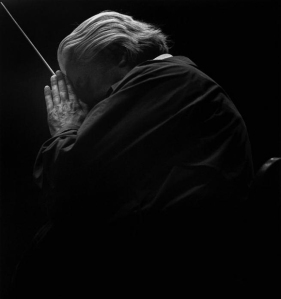Jeremy Lee writes
Celibidache, that mystical musical figure, a Zen Buddhist who believed in the transcendental side of music, that “the more complex the music, the slower the tempo”; the ex-principal conductor of the Munich Philharmonic who rejected the recording process–despite most of his concert activity recorded in surprisingly wonderful sound and released posthumously on such labels as EMI and Deutsche Grammophon–claiming that recorded music wasn’t music; the Bruckner specialist; the person who refused to play Mahler (and breaking his vow once), was and remains to this day a controversial figure: to many, his extremely slow tempi that he takes for many pieces ruin the structural integrity of the music (although there are exceptions for his slow tempi–his Bach Mass in B minor is one of the fastest modern versions ever recorded, certainly faster than Klemperer’s recording). Like him or hate him, nobody can deny the fact that during his Munich years he had raised the orchestra to world-class standards. Above all Celibidache’s Munich recordings are distinctive and renowned for the sheer beauty of the sound he extracted from the orchestra–something all the more evident in this particular recording of Fauré’s Requiem.
I cannot describe too much its stunning beauty of sound–because words alone are too futile to accurately convey such beauty. Has ever a choir sung so beautifully? Has ever an orchestra played so beautifully? Has ever a contingency of sound waves been emitted simultaneously to such an achingly arresting degree?
Just hearing a few of the movements is enough to be enticed. In Sanctus, notice the lucid, luminous strings, how the orchestra is wrapped in a bath of chorus, how naturally the horns in the climax sound their melody at first–then how they crescendo to the B flat in such an inevitably forceful yet never aggressive way that snatches your heart as they emerge from the orchestra. Margaret Price is the lovely, creamy-toned soprano in Pie Jesu whose lush voice–and that vibrato, so organic!–blend with the mellow organ and hushed orchestra in such an exquisite way it has to be heard to be believed. Then there is the Agnus Dei in which the harp caresses the affecting string melody and subsequently that of the chorus, the never impulsive yet always arresting (not without a hint of retrospection) brass as they herald the reminiscence of the very start of the work. In the (very stately) Libera Me, Alan Titus provides an introspective solo baritone voice–and the way the choir returns to the main melody in unison is so magical it is hard to believe. Celibidache’s tempo is always natural, stretching the movement so that the vestiges of sound can hover longer in the air…Lastly in In Paradisum, the organ’s small shards of light and the dark, mellow chorus and strings is reminiscent to me of the aubade–a feeling other recordings cannot present me with. The lushness of tone, the richness of the sound, the nutrition of the timbre, the healthiness of every reverberation, that SPIRITUALITY…yes, that is the beauty of the Fauré Requiem under the hands of Celibidache the weaver.
There will be naysayers of the art of Celibidache, of course, regarding the preservation of structure, the limit of how long a melody or phrase can be stretched. In Libera Me, for example, the phrase is stretched to an extent that it is broken into 2 sections, 4 bars each, instead of the normal phrase of 8. But let me at once point out that it is not the point of Celibidache’s art. If structure and phrasing is so crucial, Clutyens and Fremaux will do well. No, his art lies in his ability to produce from his orchestra beautiful sounds, and as just for that, Celibidache’s Faure Requiem stands alone from so many other great versions–it is in a class of its own.
Under Celibidache, Faure’s Mass for the Dead is simply music to die for.
Details
- Album name: Fauré: Requiem; Stravinsky: Symphony of Psalms
- Label: EMI Classics 0724355785152
- Sonics: ADD/DDD (Faure Requiem) Stereo
- Total playing time: 70:58
- Year recorded: 1994


